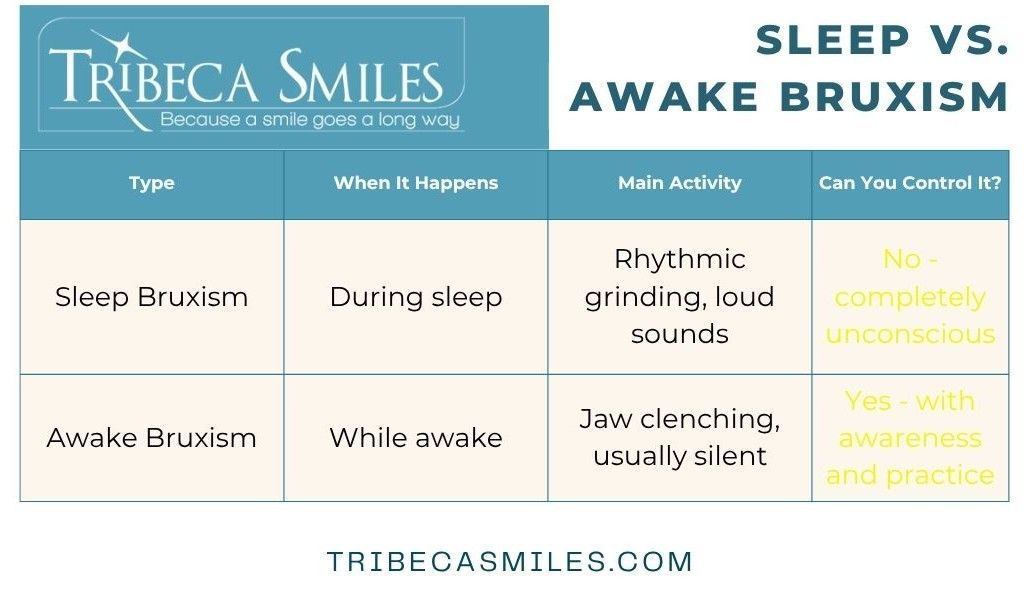Are You Grinding Your Teeth at Night? The Telltale Signs of Bruxism
Key Takeaways
- Sleep bruxism affects 8-10% of adults and can cause serious dental damage if left untreated
- Morning jaw pain, worn teeth, and partner complaints about grinding sounds are the most common warning signs
- The condition is often linked to sleep apnea, stress, and other health issues that require comprehensive treatment
Ever wake up with a sore jaw and wonder what happend during the night? You're not alone. Millions of people grind their teeth while sleeping, often without even knowing it. This unconscious habit, known as sleep bruxism, can wreak havoc on your teeth, jaw muscles, and overall quality of life if you don't catch it early.
| Table of Contents |
|---|
| 1. Understanding Bruxism: It's More Complex Than You Think |
| 2. The Most Common Signs You're Grinding at Night |
| 3. Why Sleep Matters: The Connection Most People Miss |
| 4. The Hidden Damage: What Happens If You Don't Address It |
| 5. Treatment Options That Actually Work |
| 6. When to Seek Professional Help |
| 7. The Technology Making Diagnosis Easier |
| 8. Expert Bruxism Treatment in Tribeca: Meet the Team at Tribeca Smiles |
| 9. Living Successfully with Bruxism |
| 10. Frequently Asked Questions |

Understanding Bruxism: It's More Complex Than You Think
Here's something most people dont realize - there are actually two completely different types of teeth grinding. Sleep bruxism happens when you're unconscious, making it impossible to control. Awake bruxism? That's a whole different beast. It's more like a stress habit you can learn to break once you notice you're doing it.
The distinction matters because the treatments are totally different. You can't just tell someone to "stop grinding" if they're doing it in their sleep - that's like asking them to stop snoring through willpower alone.
What causes this nighttime grinding? Scientists now know it's not about having a "bad bite" or crooked teeth, despite what people used to think. The real culprit lies in your brain's sleep regulation systems. When you experience micro-arousals during sleep (tiny wake-ups you don't remember), your jaw muscles can suddenly activate, causing that grinding motion.
The Most Common Signs You're Grinding at Night
So how do you know if you're grinding your teeth while you sleep? Your body leaves plenty of clues - you just need to know what to look for. At Tribeca Smiles, dental professionals see these telltale signs every day.
Morning Symptoms That Should Raise Red Flags
Waking up with jaw pain is usually the first thing people notice. It's that dull, achy feeling in your cheeks and temples that's worst right when you open your eyes. Sometimes it feels like you've been chewing gum for hours. The pain typically gets better as the day goes on, which is a dead giveaway that something's happening during sleep.
Tension headaches in the morning are another major warning sign. These aren't your typical headaches - they specifically affect your temples and feel like a tight band around your head. If you're popping ibuprofen every morning just to function, teeth grinding might be the hidden cause.
Do your teeth feel sensitive to hot coffee or cold water? When you grind away the protective enamel, the sensitive layer underneath gets exposed. Suddenly, that morning orange juice becomes painful instead of refreshing.
What Your Teeth Are Trying to Tell You
Your teeth themselves hold the most obvious evidence. Look in the mirror - do your teeth look shorter than they used to? Are the biting edges flat instead of having their natural bumps and grooves? These worn down teeth are like a dental fingerprint of grinding activity.
Check for chips or cracks, especially on your back teeth. The forces from grinding can be tremendous - up to 250 pounds of pressure! That's way more than normal chewing, and eventually, something's gotta give.
Here's a less obvious sign: look at the sides of your tongue. See any indentations that match your teeth? That scalloped tongue happens when you're pressing your tongue hard against your teeth all night long. Our licensed acupuncturist often notices this sign during TMJ treatments.
What Your Partner Might Notice
Sometimes the most reliable detector of sleep bruxism isn't you - it's whoever shares your bed. The grinding sounds during sleep can be surprisingly loud, often described as fingernails on a chalkboard or stones rubbing together.
If your partner has ever nudged you awake because of the noise, or mentioned it over breakfast, take it seriously. They're witnessing something you literally cannot observe yourself. Many people only discover their grinding habit after years of complaints from long-suffering partners who finally convince them to see a dentist.
Why Sleep Matters: The Connection Most People Miss
Here's where things get really interesting - and a bit concerning. Sleep bruxism often signals bigger problems with your overall sleep quality. About half of people who grind their teeth also have sleep apnea, a condition where breathing repeatedly stops during sleep.
Think about it: if your airway is closing during sleep, your brain might trigger jaw movement to help open things up. The grinding could actually be your body's desperate attempt to breathe better. This connection is so strong that TMJ and jaw tension specialists now routinely screen for sleep disorders.
Other conditions linked to nighttime grinding include:
- Acid reflux (GERD) - stomach acid triggering protective jaw movements
- Restless leg syndrome
- High stress and anxiety levels
- Certain medications, especially antidepressants
Ever notice your grinding gets worse during stressful periods? There's a reason for that. Stress doesn't directly cause the grinding, but it does mess with your sleep quality. More stress means more sleep disruptions, which means more opportunities for grinding episodes.
The Hidden Damage: What Happens If You Don't Address It
Ignoring teeth grinding is like ignoring a slow leak in your roof - the damage accumulates over time until you've got a major problem on your hands. Let me paint you a picture of what can happen.
Your Teeth Take the First Hit
Without protection, chronic grinding literally wears your teeth down to stumps. I've seen patients who've lost so much tooth structure that their whole face looks different - shorter, older, more collapsed. Once that enamel is gone, it doesn't grow back.
The financial cost? Enormous. We're talking about crowns, root canals, implants - procedures that can run into tens of thousands of dollars. All because of an unconscious habit that could've been managed with a simple night guard.
Restorative work becomes inevitable for severe cases. Our restorative dentistry team sees patients who need complete smile makeovers just from grinding damage. These aren't cosmetic choices - they're necessary to restore basic function.
TMJ Disorders: When Your Jaw Joint Breaks Down
The temporomandibular joint (TMJ) is basically the hinge that connects your jaw to your skull. Imagine opening and closing a door thousands of times with excessive force - eventually, those hinges are going to fail.
Chronic grinding can lead to:
- Clicking or popping sounds when you open your mouth
- Jaw locking in open or closed positions
- Chronic pain that radiates to your ears, neck, and shoulders
- Limited mouth opening that makes eating difficult
Some patients develop such severe TMJ problems that they can barely open their mouths wide enough to eat a sandwich. Acupuncture treatments can help manage the pain, but prevention is always better than treatment.
The Ripple Effect on Your Life
What starts as nighttime grinding doesn't stay confined to nighttime problems. The chronic pain, poor sleep, and dental issues create a cascade of life impacts:
Your work performance suffers when you're dealing with constant headaches. Your relationships strain when you're irritable from poor sleep and chronic pain. Some people become so self-conscious about their worn, damaged teeth that they stop smiling in photos.
The disturbed sleep affects both you and your partner. One patient told me their grinding was so loud, their spouse started sleeping in another room. That's when they knew they needed help.
Treatment Options That Actually Work
Good news - you don't have to live with teeth grinding forever. While there's no magic cure, there are plenty of effective ways to protect your teeth and reduce symptoms. The key is finding the right combination for your specific situation.
Night Guards: Your First Line of Defense
A custom night guard is like armor for your teeth. Unlike those bulky sports mouthguards, these are precisely fitted to your teeth by a dentist. They work by creating a barrier between your upper and lower teeth, preventing direct contact during grinding episodes.
Why custom guards beat store-bought versions:
- Better fit means you'll actually wear it
- More durable materials last longer
- Properly balanced to avoid jaw strain
- Can be adjusted as needed
Yes, custom guards cost more upfront. But compared to replacing worn teeth? They're a bargain. Most patients adjust to wearing them within a week or two. Many dental offices offer payment plans to make them more accessible.
Stress Management: Attacking the Root Cause
Since stress is a major trigger, learning to manage it can significantly reduce grinding intensity. This isn't just about feeling more relaxed - it's about improving your sleep quality and reducing those micro-arousals that trigger grinding episodes.
Techniques that help:
- Progressive muscle relaxation before bed
- Meditation apps for guided relaxation
- Regular exercise (but not right before bed)
- Limiting caffeine after 2 PM
- Creating a calming bedtime routine
Acupuncture for bruxism targets both the physical tension and underlying stress. Many patients find it helps them sleep more soundly with less grinding.
Advanced Treatments for Severe Cases
When conservative treatments aren't enough, there are more intensive options:
Botox injections into the jaw muscles can reduce grinding force by partially weakening the muscles. The effects last 3-4 months, and many patients report significant relief. It doesn't stop the grinding completely, but it takes the destructive force out of it.
Sleep studies might be necessary if sleep apnea is suspected. Treating the apnea often reduces the grinding - kill two birds with one stone.
Physical therapy can help retrain jaw muscles and improve range of motion. Special exercises stretch tight muscles and strengthen weak ones, creating better balance in your jaw system.
Making Lifestyle Changes That Matter
Small daily changes can make a big difference:
Dietary adjustments:
- Cut back on alcohol (it increases grinding)
- Avoid chewing gum (gives jaw muscles a workout they don't need)
- Skip the evening coffee (caffeine increases muscle activity)
Sleep position matters too. Sleeping on your back puts less pressure on your jaw than side-sleeping. A good pillow that supports your neck properly can reduce overall muscle tension.
Jaw awareness during the day - even though we're talking about sleep grinding, daytime habits matter. Notice if you clench when concentrating or stressed. The ideal jaw position? Teeth slightly apart, tongue gently resting on the roof of your mouth.
When to Seek Professional Help
So when should you stop trying to manage this yourself and see a professional? Here are the clear signs it's time:
- Your partner complains about grinding sounds
- Morning headaches happen more than twice a week
- Visible tooth wear or chips
- Jaw pain that doesn't improve during the day
- Difficulty chewing or opening your mouth wide
Don't wait for an emergency. Finding the right dentist who understands bruxism can save you years of damage and thousands in repairs. Some situations, like sudden severe jaw pain or complete jaw locking, need emergency dental care right away.
The Technology Making Diagnosis Easier
Diagnosis used to require expensive overnight sleep studies. Now, new technologies are making it easier to identify and monitor grinding:
Digital bite analysis shows exactly where excessive forces are occurring. 3D imaging reveals joint damage before it becomes symptomatic. Some dentists even use smartphone apps that can detect grinding sounds while you sleep.
At specialized dental practices, they combine traditional examination with these modern tools for more accurate diagnosis. The goal? Catch problems early when they're easier to treat.

Expert Bruxism Treatment in Tribeca: Meet the Team at Tribeca Smiles
When you're dealing with chronic teeth grinding, you need more than just a basic night guard. At Tribeca Smiles, Dr. Frederick Solomon and Dr. Danielle Solomon have created something unique - a practice where advanced dentistry meets Traditional Chinese Medicine for comprehensive bruxism relief.
Dr. Frederick Solomon brings 30+ years of restorative expertise to rebuild grinding-damaged teeth. Using technology like CEREC same-day crowns and 3D imaging, he doesn't just protect your teeth - he restores proper bite alignment and addresses TMJ issues. His custom night guards and NTI tension suppression devices target the specific way you grind, not just generic protection.
Dr. Danielle Solomon, a licensed acupuncturist with 20 years experience, tackles bruxism from a different angle. Her treatments show impressive results - 85% of patients report significant pain reduction, with many experiencing 75% less jaw muscle tension. The acupuncture works by releasing tight jaw muscles, reducing stress hormones, and improving the sleep quality issues that trigger grinding episodes.
What makes their approach so effective? It's the coordination. While Dr. Frederick creates your custom guard and repairs damage, Dr. Danielle helps relax the muscles causing the problem. No running between different offices, no conflicting treatments - just comprehensive care under one roof in their spa-like Tribeca practice. They even have Merlin, their therapy dog, to help anxious patients relax.
For stressed Manhattan professionals, this integrated approach finally offers real relief. Many patients find that combining a properly fitted guard with regular acupuncture sessions gives them what years of other treatments couldn't - peaceful sleep without morning headaches.
Living Successfully with Bruxism
Here's the truth - many people with bruxism live perfectly normal lives once they get proper treatment. It becomes just another health condition you manage, like wearing glasses or taking vitamins.
The key is consistency. Wear your night guard every night, even when traveling. Keep up with stress management techniques even when life gets busy. Regular dental checkups catch problems before they become expensive disasters.
Remember, grinding is often your body's response to other issues - stress, sleep problems, even certain medications. Addressing those root causes while protecting your teeth gives you the best shot at minimizing long-term damage.
Some patients find that once they start treatment, other problems improve too. Better sleep leads to more energy. Less jaw pain means fewer headaches. Protected teeth mean confident smiles. It's all connected.
Frequently Asked Questions
Can children grind their teeth?
Yes, it's actually quite common in kids - up to 40% do it. Most outgrow it by adolescence, but severe cases should be evaluated by a dentist to prevent damage to permanent teeth.
Will a night guard stop my grinding completely?
No, guards don't stop grinding - they protect your teeth from damage during grinding episodes. Think of them as protective equipment, not a cure.
How long do custom night guards last?
With proper care, a quality custom guard can last 5-10 years. Severe grinders might need replacement every 2-3 years. Still cheaper than fixing damaged teeth!
Can grinding return after successful treatment?
Yes, especially during stressful periods. That's why ongoing management is important. Keep your night guard handy even if you haven't needed it for awhile.
Is teeth grinding genetic?
Research shows 20-50% of grinders have family members who also grind. There's definitely a genetic component, though lifestyle factors play a huge role too.
Can I use a sports mouthguard instead?
Sports guards are too bulky for sleep and aren't designed for grinding forces. They can actually make jaw problems worse. Invest in a proper night guard - your teeth will thank you.
What if I can't tolerate wearing a night guard?
Start by wearing it for short periods while awake to get used to it. Some people need a different style or material.Sedation options can help anxious patients during the fitting process.
How quickly will I see results from treatment?
Morning jaw pain often improves within days of using a night guard. Headaches might take a few weeks. Preventing long-term damage is immediate, even if you don't feel different right away.



